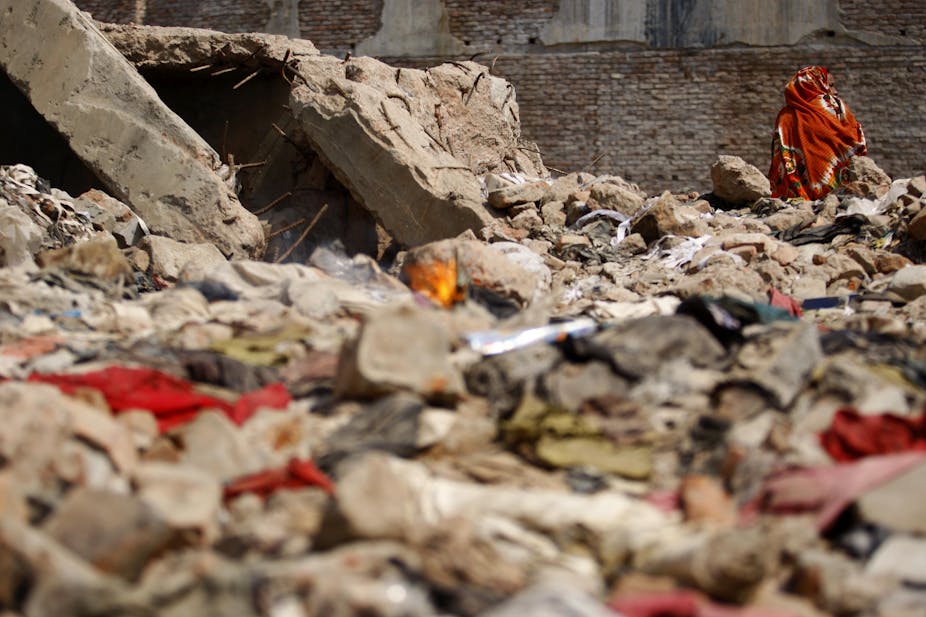A year has now passed since an 8-storey building in Dhaka known as Rana Plaza collapsed killing 1,134 workers in just an hour. Much of the commentary since has focused on the need for Western brands to be more vigilant when it comes to “dodgy” third-world suppliers. Much less attention, surprisingly, has been paid to the systemic nature of the problem which increases the likelihood of such tragedies.
The story begins at home. Apparel is a mature, competitive market. Brands are locked in a struggle where they need increasingly cheaper locations to make the garments – and shorter turn-around times.
Think of it as a network in which some nodes are central and powerful. These are the brands. There are others that are more peripheral and much less powerful. These are factories based in the developing world. Most of them are making “commodities”, or apparel that is essentially the same. They compete on price. In order to grow their profits, brands keep pushing factory owners – who pass on that pressure to hapless workers, whose desperate poverty leaves them little choice in the matter.
When it comes to the relationship between big brands and Bangladesh, the brands own the customers and have all the power. Bangladesh is desperately dependent on its apparel industry – it employs almost 4m workers and accounts for more than 80% of the country’s exports. It simply cannot afford to lose the business big brands send its way. And the reason they do it is only because Bangladesh remains by some distance the cheapest place on the planet to get a ready-made garment stitched.
In this equation, the Rana Plaza tragedy really becomes a problem only for Bangladesh. For the brands, it is no more than an inconvenience. Indeed, the apparel industry continues to boom, with brands such as Primark announcing significant rises in profitability.
The grist for the mill here is poverty. The astonishingly low cost that Bangladesh offers (20p an hour) at the expense of workers’ welfare is the foremost reason for its apparel industry’s much vaunted “success”. Bangladesh’s “competitiveness” in the apparel trade essentially boils down to desperate poverty and a lack of industrialisation, which means workers have to accept a choice between paltry wages – which keep them below the poverty line – and nothing at all.
Any labour movement to raise workers’ wages is met with either the threat of unemployment or brute force. Both have proved to be highly effective. In 2012, a leader of the Bangladesh Centre for Worker Solidarity was tortured and murdered. Similarly, worker strikes in the past have been met with harassment, including death threats.
Don’t expect the Bangladeshi government to do anything to seriously stop this: it knows full well that its precious foreign exchange is only guaranteed by worker poverty and the existence of a large network of subcontractors functioning under the surface (these are the unaudited facilities where workers toil away in subhuman conditions).
A global problem
This pressure to reduce costs through worker mistreatment isn’t unique to Rana Plaza, or even to Bangladesh. Rana Plaza was simply the latest in a series of disasters that have taken place in textile factories in the global South. In 2012, 289 workers died in a fire at a garment factory in Karachi. In the same year, at least 112 workers were burned alive in a similar factory outside Dhaka.
In a globalised production system, where unindustrialised poor countries find themselves locked in desperate competition for business from Western brands, workers pay with their lives to keep brands competitive in affluent markets. In a capitalist system, competitors have no choice but to grow. When markets are mature and margins thin, it is the weakest link in the chain that comes under the greatest strain.
The plight of Bangladeshi workers is not going to get better through Corporate Social Responsibility initiatives. Big brands are loathe to commit to any relationship beyond a few consignments, which makes them wary of investing anything in a particular factory. They are faced with a much more powerful imperative: increased profits.
In a neoliberal world order, neat, clean, sustainable factories which pay workers a decent wage do not do much for anyone’s business model. Our economies thrive on consumption. After every crisis, we are told to go back to the shopping malls and buy more. It is unlikely that any government is going to risk a recession by suggesting that we cut back on consumption.
Bangladesh has been lauded in recent years for its economic growth. But in effect the country is simply winning a race that only leads to the bottom. Continuing to compete on its poverty is an unsustainable strategy. How many workers need to lay down their lives before something changes? The Bangladeshi government is unlikely to risk losing all its business by giving workers a fair wage and the International Labor Organization long ago lost all its teeth along with its spine.
Rana Plaza is merely a symptom of a deeper malaise: global production networks in which consumers in affluent countries continuously dress themselves in new robes at the expense of invisible, desperate workers in far away places. In a globalised world we need new global institutions which are equally committed to all workers, regardless of whether they are in the European Union or South Asia. Anything short of that is merely shifting chairs on the deck of the Titanic.

